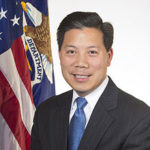In a continuation of last year’s seasonal series, this winter, each PCUR will interview a Princeton alumnus from their home department about his/her experience writing a senior thesis. In Looking Back on Undergraduate Research: Alumni Perspectives, the alumni reveal how conducting independent research at Princeton influenced them academically, professionally, and personally. Here, Nicholas shares his interview.
~~~~~~

NW: Why did you decide to major in the Woodrow Wilson School?
CL: I was drawn to the Wilson School because of the interdisciplinary nature of the program. I also enjoyed the junior-year policy task forces that bring together small groups to strategize about a specific topic.
NW: Can you tell us about your independent work? Why did you decide to research the topic you did?
CL: My senior thesis was titled, “The Morning After: Press Coverage of Presidential Primaries, 1972-1984.” I focused on the rise of the modern primary system and how press coverage has shaped the public’s understanding of winners and losers, as well as which primaries are important to win. As the senior news editor at the Daily Princetonian, the thesis was a perfect way for me to combine my interests in journalism and politics.
NW: What advice would you give students writing their theses today?
CL: Find a topic that you genuinely love; find an adviser who is interested in guiding your research; and start your research early. I was already thinking about my thesis midway through my junior year, and by the fall of my senior year, I had conducted a great deal of the research.
NW: How did your policy background and research at Princeton influence your professional career?
CL: My Princeton research and my professional career came together in a perfect way when I worked for then-Senator Obama during his pursuit of the Democratic presidential nomination in 2008. The media landscape had evolved significantly in the 20 years after my Princeton graduation, but many of the central findings in my thesis were still relevant in 2008. Now, as an at-large member of the Democratic National Convention, I will play a role in shaping how the 2020 presidential primary process is conducted.
I am thankful for the chance to interview Chris, whose career blended elements of his Princeton experience, academic research, and public service. And as one of the highest-ranking Asian Americans in the Obama administration, he helped to blaze a path. Despite the change in presidential administration, his experiences and lessons are just as relevant today.
— Nicholas Wu, Social Sciences Correspondent

